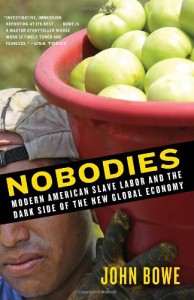
Riveting, Gifted Reporting, Deeply Depressing, Call to Arms, May 18, 2008
John Bowe
This is a spectacular piece of work with many gifted turns of phrase. The author has done his homework, and melds economic facts and philosophical reflections in a worthy manner. The author opens with a challenge: how should a free people respond to slavery, i.e. should they knowingly buy products and services that are rooted in slavery?
I ordered this book on the strength of the author's appearance on CSPAN BookTV, and this is one of those instances where I think that listening to him talk about the book first is hugely beneficial to appreciating the book. The author, in person (on CSPAN), is funny, intelligent, informative, a really excellent presenter of facts in a coherent manner.
Supreme Court Justice Brandeis is cited in this book: “You can have great concentration of wealth in the hands of a few or you can have democracy. You can't have both.” While the author documents slavery, at least 27 million world-wide (not counting the prison-slave population) with 800 million not enslaved but utterly poor going hungry each day, 33 million of them in the USA, his book is a socio-economic ideo-cultural treatise on “whither globalization.” His bottom line is clear: if we allow slave labor and sweatshop conditions to undercut each of our homeland industries, we are toast.
The author does something quite special with this book. I am deeply impressed. Since the 1970's I have understood the conflict between multinational corporations and governments, the trade-offs between profits and social value, but it is only recently that my reading has brought forth the sharp battle that will define the 21st Century: the battle between Collective Intelligence (one for all, all for one) and Corruption at all levels of government and business.
The meme “true cost” is the ideological battle line. Also known as the triple bottom line (economic, social, and environmental), it is my view that the ability of my generation to promulgate True Cost information in the next ten years is going to determine what kind of future our children have. The author provides numbers, and I am gripped by the 40 cents paid to the slave laborer for a bucket of tomatos, versus the $12.00 plus paid to the farmer or “organizer/enforcer.” The author is eloquent in describing how slave wages have not risen in thirty years, while all else has….
This book is deep, richly textured, a tremendously informative and socially-valuable offering.
Here are a few highlights that stayed with me:
1) US Census statistics are so “delusional and deceptive” that Wall Street investors no longer use them–they commission their own studies.
2) The conditions of slavery and poverty and abuse are so deeply entrenched, and imposed on individual held in isolation from society and the rule of law–when the law is willing to be enforced–that they might as well be on another planet, a slave planet.
3) FBI Special Agents get very high marks for being able to master law enforcement in an illegal immigration environment, but the author speaks of “institutional malfeasance” in how often the FBI transfers people. I have long felt that we need to turn government inside out–we need to mass Latin American specialists across government, military, law enforcement, etc, and we need to start putting people into 10 year tours.
4) It is clear we need a “white hat” side of the Immigration and Naturalization Service (INS), I envision something in which all information they might collect in investigating human rights and other labor violations is firewalled from illigal immigrant status.
5) 911 operators are virtually helpless in responding to foreign langugage calls. I have been saying for years that we need to have an international implementation using Telelanguage.com.
6) The author surprises me with his optimism, his expectation that we can achieve a profound change in attitude across our population, completely boycotting all products and services whose “true cost” include slave labor.
I want to end this laudatory review by pointing readers toward the World Index of Social and Environmental Responsibility, the Interra Project, the World Cafe, and the Earth Intelligence Network.
Below I list a few other books that support this one. The first book documented the commoditization of human labor as the beginning of commercialized evil. The rest are increasingly positive about all of us coming together to overcome power and information asymmetries. “Put enough eyes on it, no bug is invisible. That's us: intelligence officers to the poor and the disenfranchised, who in being lifted from slavery, will create infinite revolutionary wealth. We can do this.
The Manufacture Of Evil: Ethics, Evolution, and the Industrial System
The Working Poor: Invisible in America
Nickel and Dimed On (Not) Getting By in America
The Case Against Wal-Mart
Off the Books: The Underground Economy of the Urban Poor
The Power of the Powerless: Citizens Against the State in Central-Eastern Europe
A Power Governments Cannot Suppress
The Tao of Democracy: Using Co-Intelligence to Create a World That Works for All
The Wealth of Networks: How Social Production Transforms Markets and Freedom
Collective Intelligence: Creating a Prosperous World at Peace


